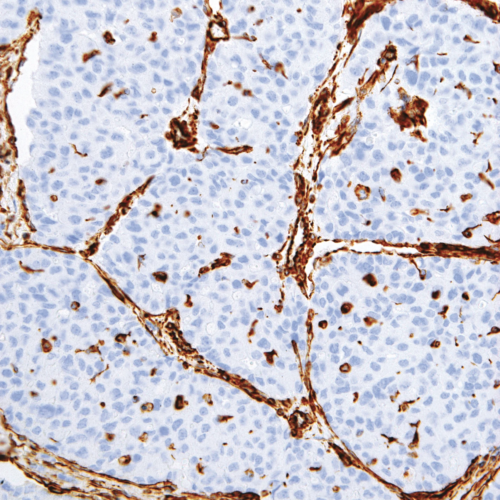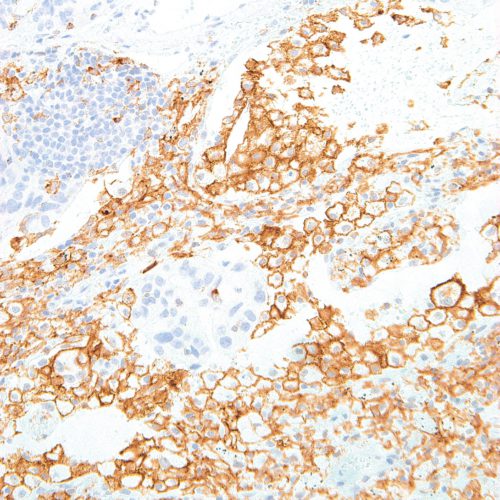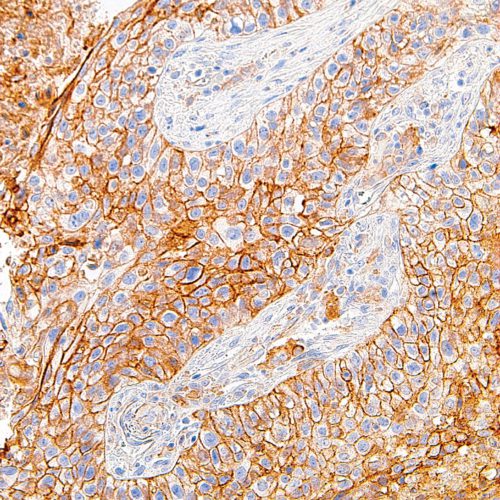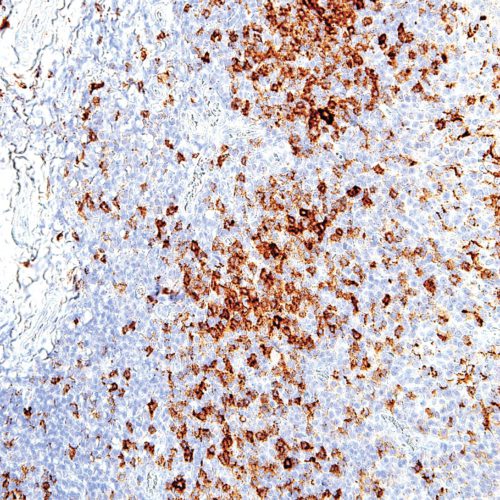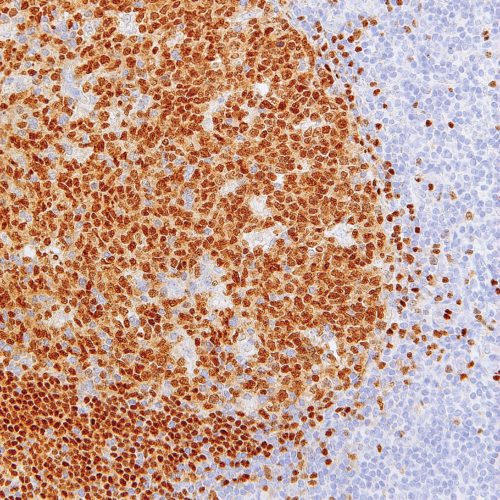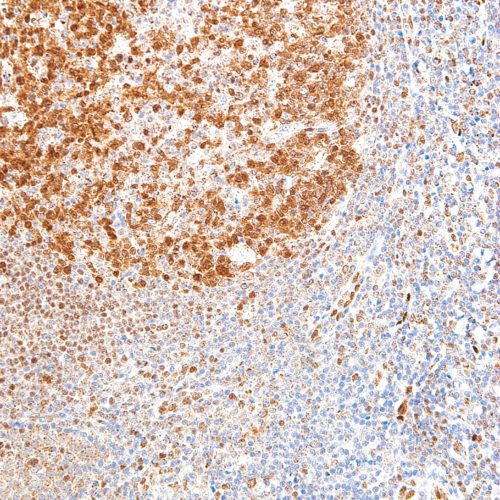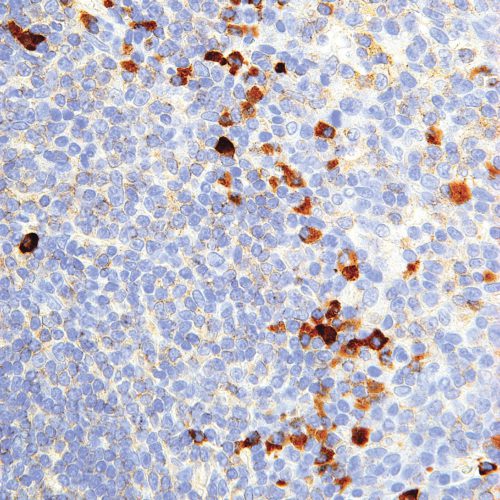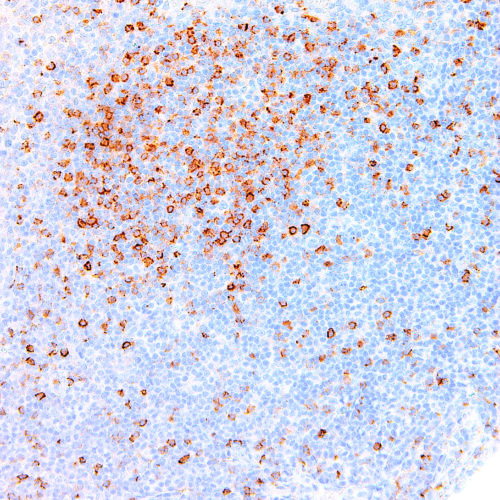High quality products to support Pathologists and Biological and Environmental Scientists
GeneAb™ Vimentin
$64.50 – $311.75Vimentin is a component of intermediate filament in mesenchymal cells, such as endothelial cells, fibroblasts, lymphocytes, and melanocytes. Anti-Vimentin is useful for assessing whether tissue samples have been processed and preserved properly. A panel of Anti-Vimentin and Anti-Keratin is useful for differentiating melanomas from large cell lymphomas and undifferentiated carcinomas. This diagnostic grade Vimentin IVD antibody stains melanomas and schwannomas, as well as Endometrial endometrioid adenocarcinomas.
GeneAb™ TIM3
$188.12 – $924.50T-cell Immunoglobulin and Mucin-Domain-Containing Molecule-3 (TIM3) is present on T-helper type 1 lymphocytes and other immune cells including dendritic cells and natural killer cells. TIM3 is overexpressed in CD4 tumor-infiltrating lymphocytes, including those with non-small cell lung cancer associated with poor prognoses. TIM3 has recently emerged as a potential target for cancer immunotherapy.
GeneAb™ PD-L1
$155.88 – $671.88Programmed Death-Ligand 1 (PD-L1), also known as CD274 or B7 Homolog 1 (B7-H1), is a transmembrane protein involved in suppressing the immune system and rendering tumor cells resistant to CD8 T cell-mediated lysis through binding of the Programmed Death-1 (PD-1) receptor. Overexpression of PD-L1 may allow cancer cells to evade the actions of the host immune system. In renal cell carcinoma, upregulation of PD-L1 has been linked to increased tumor aggressiveness and risk of death, and, in ovarian cancer, higher expression of this protein has lead to significantly poorer prognosis. PD-L1 has also been linked to systemic lupus erythematosus and cutaneous melanoma. When considered in adjunct with CD8 tumor-infiltrating lymphocyte density, expression levels of PD-L1 may be a useful predictor of multiple cancer types, including stage III non-small cell lung cancer, hormone receptor negative breast cancer, and sentinel lymph node melanoma.
GeneAb™ PD-1
$75.25 – $301.00Programmed Death 1 (PD-1) is a member of the CD28/CTLA-4 family of T-cell regulators, expressed as a co-receptor on the surface of activated T-cells, B-cells, and macrophages. New studies have suggested that the PD-1/PD-L1 signaling pathway may be linked to anti-tumor immunity, as PD-L1 has been shown to induce apoptosis of activated T cells or inhibit activity of cytotoxic T cells. In comparison to CD10 and Bcl-6, PD-1 is expressed by fewer B cells and has therefore been considered a more specific and useful diagnostic marker for angioimmunoblastic T-cell lymphoma. Therapies targeted toward the PD-1 receptor have shown remarkable clinical responses in patients with various types of cancer, including non–small-cell lung cancer, melanoma, and renal-cell cancer.
GeneAb™ PAX-5
$53.75 – $274.12PAX-5 is a member of the paired box (PAX) family of transcription factors, which are key regulators in early development. The PAX-5 gene encodes the B-cell lineage specific activator protein (BSAP), whose expression is limited to early stages of B-cell differentiation. Anti-PAX-5 is useful in differentiating between classic Hodgkin’s lymphoma versus multiple myeloma and solitary plasmacytoma, as the protein is expressed in mature and precursor B-cell non-Hodgkin’s lymphomas/leukemias while being absent from the other two conditions. Diffuse large B-cell lymphomas are positive for PAX-5, with the exception of those with terminal B-cell differentiation, and T-cell neoplasms do not stain with Anti-PAX-5.
GeneAb™ LMO2
$118.25 – $537.50LMO2, also known as LIM-Only transcription factor 2, RBTN2, or TTG2, is an oncoprotein that is expressed in normal germinal center B-cells, as well as bone marrow hematopoietic precursors and endothelial cells. LMO2 plays a role in angiogenesis and hematopoesis, and its expression has been detected in erythroid and myeloid precursors, megakaryocytes, and also in lymphoblastic and acute myeloid leukemias. LMO2 protein expression has been noted in diffuse large B-cell lymphoma, the most common adult non-Hodgkin lymphoma, as well as follicular lymphoma, a neoplasm derived from germinal center B-cells that accounts for a number of cases of non-Hodgkin lymphomas.
GeneAb™ Kappa
$37.62 – $150.50Anti-Kappa recognizes surface immunoglobulin on normal and neoplastic B-cells, and has been indicated as a potential aid in the identification of leukemias, plasmacytomas, and certain non-Hodgkin’s lymphomas, where the expression of a single light chain class is restricted. The determination of light chain ratio is critical in evaluating B-cell neoplasms, as the majority of B-cell lymphomas express either kappa or lambda light chains, while a mixture of kappa and lambda is characteristic of reactive proliferations. In paraffin-embedded tissue, Anti-Kappa displays strong staining of kappa-positive plasma cells, as well as cells that have absorbed exogenous immunoglobulins.
GeneAb™ Hairy Cell Leukemia
$161.25 – $731.00Anti-Hairy Cell Leukemia stains various B-cells in the follicular mantle zone and virtually all cases of hairy cell leukemia. It also stains some high grade B-cell lymphomas.
